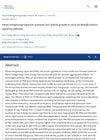 February 2024 in “International neuropsychiatric disease journal”
February 2024 in “International neuropsychiatric disease journal” Alopecia areata severely impacts quality of life, mental health, and work productivity.
1 citations
,
February 2024 in “Diversity” African plants can treat hair issues and may help with diabetes.
 November 2023 in “International Journal of Pharmaceutics”
November 2023 in “International Journal of Pharmaceutics” The new delivery system improves treatment for hair loss by enhancing drug absorption and effectiveness.
 2 citations
,
July 2023 in “Journal of dermatology”
2 citations
,
July 2023 in “Journal of dermatology” Alopecia areata causes a significant economic burden in Japan, mainly due to productivity loss.
 March 2023 in “Chemical biology & drug design”
March 2023 in “Chemical biology & drug design” Panax notoginseng saponins help hair growth in mice.
4 citations
,
January 2023 in “Medical Journal of Babylon” Hemp seed oil shows promise in treating localized alopecia areata.
January 2023 in “International Journal of Trichology” The hemp extract significantly increased hair regrowth in both men and women without any side effects.
 40 citations
,
August 2022 in “Frontiers in immunology”
40 citations
,
August 2022 in “Frontiers in immunology” Blocking JAK/STAT pathways can help treat hair loss from alopecia areata.
 2 citations
,
January 2022 in “Dermatologic Therapy”
2 citations
,
January 2022 in “Dermatologic Therapy” Natural products like saw palmetto, caffeine, melatonin, marine extracts, rosemary oil, procyanidin, pumpkin seed oil, and cannabidiol oil could potentially treat male hair loss.
17 citations
,
November 2021 in “Journal of Cosmetic Dermatology” Combination therapies for androgenetic alopecia work best but can have significant side effects and costs.
20 citations
,
August 2021 in “Journal of Cosmetic Dermatology” Cannabinoids might help with skin diseases and hair growth, but more research is needed.
3 citations
,
January 2021 in “Journal of dermatology & cosmetology” Current alopecia treatments manage symptoms but don't cure, and better treatments are needed.
 23 citations
,
December 2020 in “Frontiers in Cell and Developmental Biology”
23 citations
,
December 2020 in “Frontiers in Cell and Developmental Biology” Gene network oscillations inside hair stem cells are key for hair growth regulation and could help treat hair loss.
 86 citations
,
July 2020 in “International Journal of Molecular Sciences”
86 citations
,
July 2020 in “International Journal of Molecular Sciences” Activating the Wnt/β-catenin pathway could lead to new hair loss treatments.
 27 citations
,
September 2018 in “Nanomedicine: Nanotechnology, Biology and Medicine”
27 citations
,
September 2018 in “Nanomedicine: Nanotechnology, Biology and Medicine” Further research is needed to improve hair regeneration using stem cells and nanomaterials.
 153 citations
,
March 2017 in “Endocrine”
153 citations
,
March 2017 in “Endocrine” Male pattern baldness involves genetics, hormones, and needs better treatments.
 17 citations
,
October 2015 in “Medicine and Pharmacy Reports”
17 citations
,
October 2015 in “Medicine and Pharmacy Reports” Animal models are crucial for learning about hair loss and finding treatments.
 19 citations
,
July 2015 in “Journal of Ginseng Research”
19 citations
,
July 2015 in “Journal of Ginseng Research” Korean Red Ginseng may protect against hair loss caused by chemotherapy.
147 citations
,
October 2004 in “Experimental dermatology” Hormones like testosterone affect skin functions and can cause skin issues when in excess; treatments to manage these effects are only somewhat effective.
 1113 citations
,
August 1999 in “The New England Journal of Medicine”
1113 citations
,
August 1999 in “The New England Journal of Medicine” Hair follicle biology advancements may lead to better hair growth disorder treatments.
 227 citations
,
January 1998 in “Journal of Endocrinology”
227 citations
,
January 1998 in “Journal of Endocrinology” Cells from balding scalps have more androgen receptors than cells from non-balding scalps.
77 citations
,
January 1993 in “Skin Pharmacology and Physiology” Steroids stop hair growth temporarily but don't block the signals that start it.


















